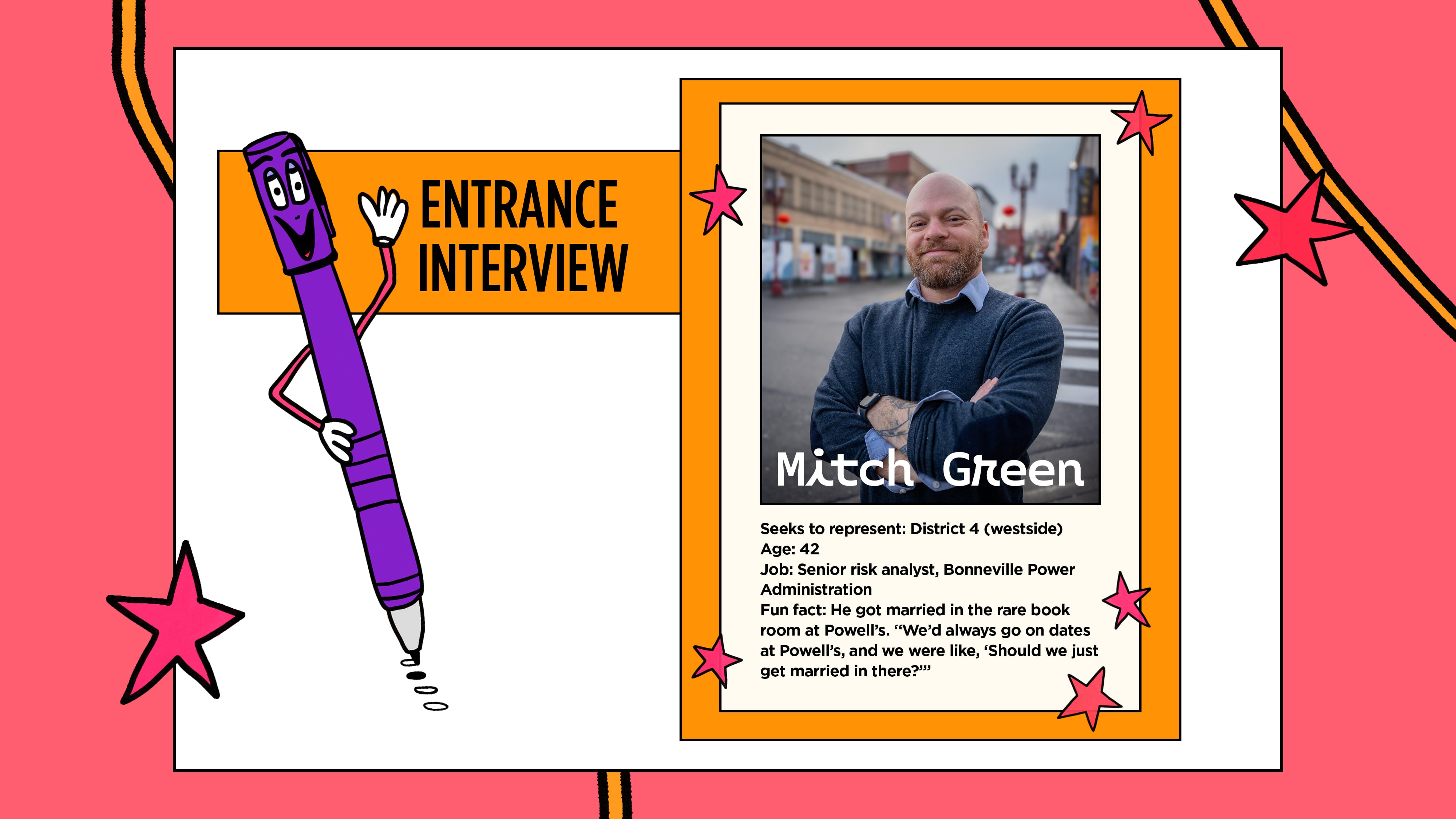- Seeks to represent: District 4 (westside)
- Age: 42
- Job: Senior risk analyst, Bonneville Power Administration
- Fun fact: He got married in the rare book room at Powell’s. “We’d always go on dates at Powell’s, and we were like, ‘Should we just get married in there?’”
Mitch Green knows a little bit about the electrical grid. He specializes in energy economics for the Bonneville Power Administration, where he’s worked for more than a decade as a senior risk analyst trying to understand climate investment from a financial standpoint.
It’s also what spurred him to make his first run for public office.
“Like a lot of Portlanders, I was kind of like, the vibes are off,” he said. “Then we had the cold snap in the winter and power got knocked out, and having a city that doesn’t have the capacity to respond, that’s what ultimately pushed me into the race.”
He grew up in Portland and Vancouver, Wash., and was the first generation of his family to attend college (Portland State University, then the University of Missouri–Kansas City). He’s also taught college courses—economics, including at Franklin & Marshall College in Pennsylvania.
Green is among the first 18 City Council candidates to qualify for matching funds from the Small Donor Elections program, and has raised $17,567. That’s a good signal of robust early support, as is: Most of those contributions have been less than $25, and he hasn’t gotten any above $1,000.
He says his closest adviser is Nick Caleb, a progressive Portland climate and energy lawyer.
Green spoke to WW by phone, then answered follow-up questions by email. The interview has been edited for brevity and clarity.
WW: What are your top three priorities if elected?
Mitch Green: I’d like to set the city up to do clean energy development directly in a way that takes advantage of the Inflation Reduction Act. I know how to do that, that’s my day job.
I’d like to pursue an affordable housing agenda that’s a little more creative than what we’ve tried. I’m very interested in pushing forward a social housing model, where the city owns the projects and sets the rents at a rate that folks can actually afford.
Finally, investing in compassionate community safety, like fully funding and expanding Portland Street Response, and investing in transit and walkability.
Do you support the city staying in the Joint Office of Homeless Services? What’s your plan to address homelessness?
I think the city should stay in the Joint Office. We need to treat homelessness as a public health issue. We can’t just rip apart relationships and start from scratch.
I think there are administrative changes we can do to get creative and build more housing. We need to try some stuff in the short run, and in the longer run, I like the approach to social housing, where the city takes a much more active role in the real estate game. The city, through a development authority, builds and owns a portfolio of housing where units are leased at an affordability level specific to each tenant.
Would you change the Portland Clean Energy Fund, and if so, how?
I think PCEF is one of our crown jewels, so the short answer is, I think we should preserve it and expand it. We can make it more effective by building up our administrative capacity to get creative with how we use those funds to support clean energy development. What I don’t like to see from our city leaders is leaving money on the table.
Which current City Council member do you and your policies most align with?
Carmen Rubio and I would probably be most aligned based on the issues our supporters care about, which are things like PCEF and energy justice issues.
What should city leaders be doing to revive downtown that they’re not?
The city seems to be rehashing the old playbook, like extending new tax cuts and incentives to draw people in, which is a model based upon the Central Business District being a place for commuters. But the reality is that our economy has changed, and if we want to help it grow and recover, we need to address the imbalance between our supply of commercial real estate versus residential real estate.
How do you want police to respond to the riots in November if Trump wins?
I think police should respect protesters’ First Amendment rights to assemble peaceably. I’ve seen firsthand the imbalance when you’re down there. You’ve got veterans, you’ve got a Wall of Moms, you’ve got people of color protesting for Black lives, and I’ve seen really violent repression from the police. Then I’ve seen police stand with their backs to Proud Boys and other right-wing agitators that have a history of violence. I think the police should use every tool they have to avoid violence, to avoid the use of riot measures, of tear gas.
How do you plan to win this election?
People are dissatisfied with the willingness of their leaders to move our values into action. We can’t afford disengagement and apathy in our current movement. I think I can mobilize voters by saying, hey, it’s time to win out. Treat it like the house is on fire.
See the other Portland City Council Candidates here!
 This article is part of Willamette Week’s Ballot Buddy, our special 2024 election coverage. Read more Ballot Buddy here.
This article is part of Willamette Week’s Ballot Buddy, our special 2024 election coverage. Read more Ballot Buddy here.
